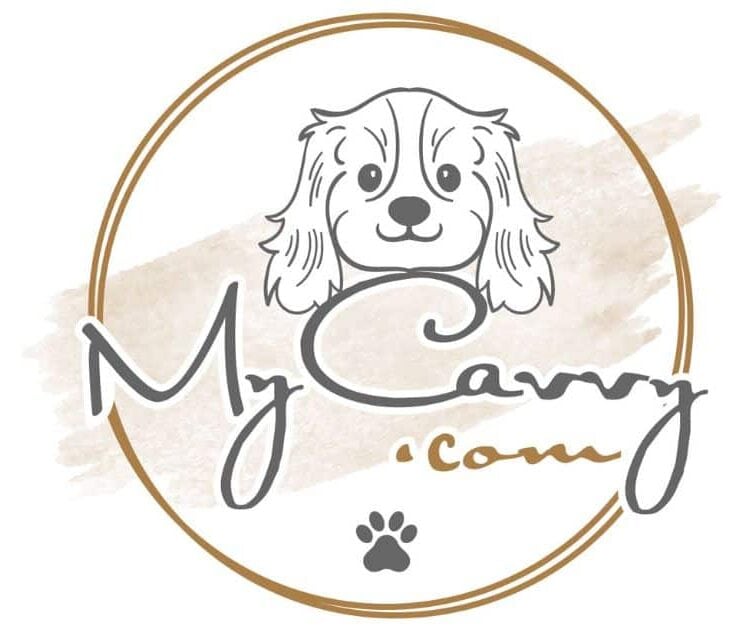We all love a treat, especially when you are a Cavalier King Charles Spaniel. But generic off-the-shelf treats can be very boring and full of additives. That’s why finding healthy and delicious alternatives for your furry friend is important.
Alternative dog treats are a great option, allowing you to control the ingredients and ensure they get the best. Plus, making them yourself can be a fun and rewarding activity. There is a selection of ideas for alternative treats for dogs below, but this is just the beginning, so be adventurous. Your Cavvy will love it.
1. Freeze-dried Liver
A flavorful and nutritious snack that most dogs love, made by freeze-drying fresh liver, which helps to retain its natural flavor and nutritional content.
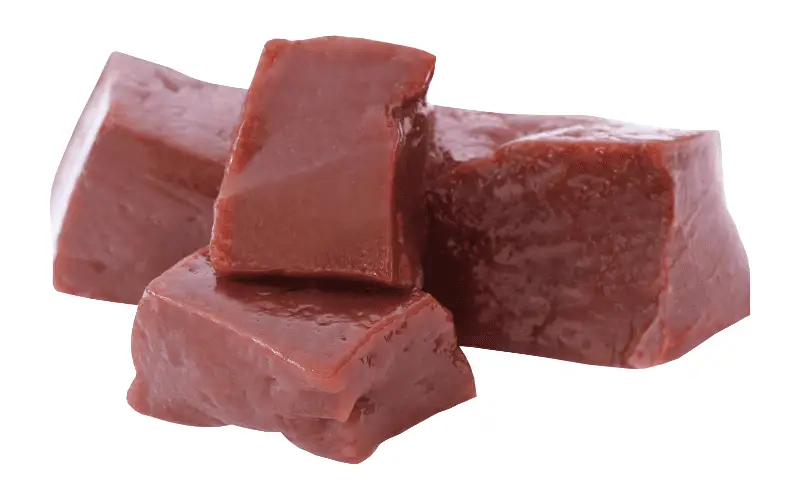
The freeze-drying process removes moisture from the liver, creating a lightweight and shelf-stable product. This makes freeze-dried liver a convenient option for pet owners on the go.
Whether used as a training treat or a special reward, the freeze-dried liver will surely delight your furry friend and provide them with a tasty source of protein.
Irresistible Flavor
Freeze-dried liver has a strong, appealing aroma and a rich, meaty flavor that dogs, including Cavaliers, absolutely love. The intense taste of liver makes it a high-value treat, making it highly effective for training, rewarding, and reinforcing good behavior in your Cavalier.
Nutritional Value
The liver is a nutrient-dense organ meat that offers various essential nutrients beneficial for dogs. It is an excellent source of protein, vitamins (such as vitamin A, B vitamins, and vitamin K), and minerals (such as iron, copper, and zinc). Including freeze-dried liver treats in your Cavalier’s diet can contribute to a balanced and nutritious snack option.
Digestibility
Freeze-dried liver treats are typically made from pure liver without any added artificial ingredients or fillers. The liver is a highly digestible protein source for dogs. This makes it suitable for dogs with sensitive stomachs or digestive issues, ensuring they enjoy a tasty treat without gastrointestinal discomfort. However, checking with your vet before giving out this delicious snack is always best.
Convenience and Portability
Freeze-dried liver treats are lightweight, dry, and have a long shelf life. They are easy to store and carry, making them convenient for on-the-go situations or as a quick reward during walks or training sessions. The absence of moisture in freeze-dried liver treats also means they won’t leave a residue in your pocket or treat pouch.
Versatile and Breakable Texture
Freeze-dried liver treats have a firm yet brittle texture, which allows them to be easily broken into smaller pieces for portion control. This versatility makes it easier to adjust the treat size according to your Cavalier’s needs, whether using them for training or simply offering a small snack.
Limited Ingredient Profile
You can’t get a simpler ingredient list; it’s just liver. This can be beneficial if your Cavalier has specific dietary restrictions or allergies. The limited ingredient profile reduces the likelihood of triggering adverse reactions.
Dental Health
While freeze-dried liver treats may not have the same dental benefits as specifically designed dental chews, their texture can still offer mild abrasive action when chewed. This can help remove plaque and tartar from the teeth, contributing to better oral hygiene and fresher breath for your Cavalier.
2. Carrot Sticks
Crunchy and low in calories, carrots make a great natural treat option.
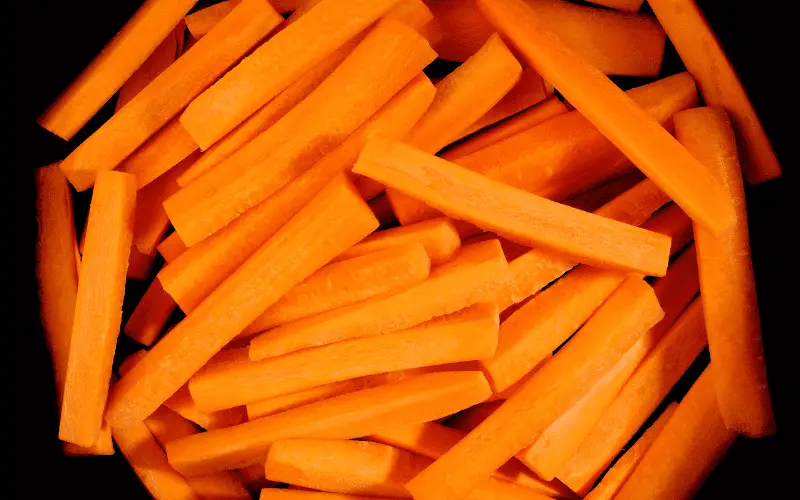
Nutritional Value
Carrots are packed with essential vitamins and minerals, making them a healthy and nutritious treat option for Cavaliers. They are particularly rich in beta-carotene, vitamin A, K, and fiber. These nutrients support overall health and immune function and contribute to a shiny coat and healthy skin.
Low in Calories
Carrots are low in calories and have a high water content, making them a great treat option for dogs, including Cavaliers, who may be prone to weight gain. They provide a satisfying crunch and can help satiate your dog’s appetite without adding excessive calories to their diet. This makes carrot sticks an excellent choice for dogs on a weight management plan or those who need portion-controlled treats.
Dental Health
The firm texture of carrot sticks provides a natural chewing action that can help clean your Cavalier’s teeth. Chewing on carrot sticks can help remove plaque and tartar buildup, promoting better oral health and reducing the risk of dental problems such as gum disease or tooth decay. However, remember that while carrots can contribute to dental health, they are not a substitute for regular brushing or professional dental care.
High in Fiber
Carrots are a good source of dietary fiber, which aids in maintaining healthy digestion in dogs. Including carrot sticks in your Cavalier’s diet can help support regular bowel movements and prevent constipation. The fiber content also adds bulk to the diet, promoting a feeling of fullness and potentially aiding in weight management.
Natural and Digestible
Carrots are a natural and easily digestible food for dogs. They are free from artificial additives, preservatives, and fillers, which makes them a safe and wholesome treat option for Cavaliers. Carrots are unlikely to cause digestive upset or trigger allergies, making them suitable for dogs with sensitive stomachs or dietary sensitivities.
Antioxidant Benefits
Carrots contain antioxidants such as beta-carotene and vitamin C, which help neutralize harmful free radicals in the body. These antioxidants support the immune system, reduce inflammation, and improve overall health and well-being. Including carrot sticks as treats can provide these antioxidant benefits to your Cavalier.
Versatility
Carrot sticks are convenient and versatile treats that can be easily prepared and carried. They can be sliced into sticks or grated for smaller dogs or puppies. Depending on your dog’s preference, carrots can be enjoyed raw or lightly steamed. Their naturally sweet flavor and crisp texture make them enjoyable for most dogs, including Cavaliers.
When offering carrot sticks as treats, ensure they are cut into appropriate sizes to prevent choking or swallowing whole. Always supervise your dog while enjoying a treat and remove any small or sharp pieces that could pose a choking hazard.
3. Green Beans
Steamed or lightly cooked green beans offer a low-calorie treat option.
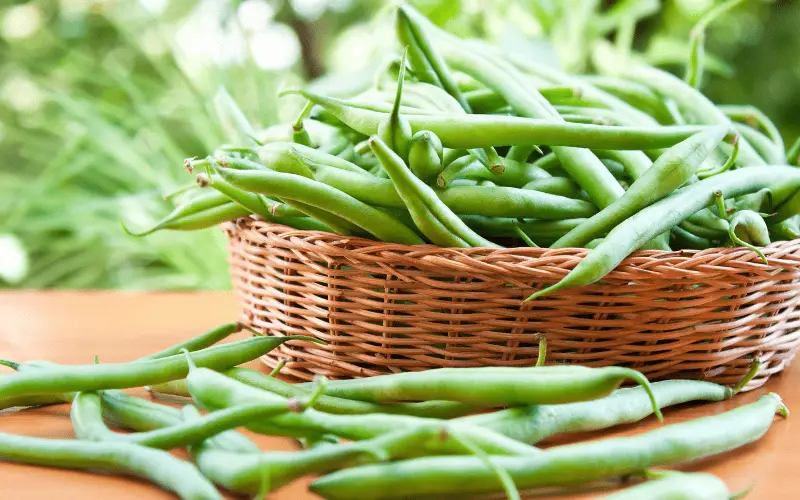
Low in Calories
Green beans are a low-calorie vegetable, making them a healthy treat option for dogs, including Cavaliers. They provide a satisfying crunch without adding excessive calories to your dog’s diet. This makes green beans a great choice for dogs who need portion-controlled treats or are on a weight management plan.
High in Fiber
Green beans are rich in dietary fiber, which aids in maintaining healthy digestion in dogs. The fiber content helps support regular bowel movements, prevents constipation, and can contribute to a feeling of fullness. Including green beans as treats can provide digestive benefits for your Cavalier.
Nutritional Value
Green beans are a good source of vitamins, minerals, and antioxidants. They contain vitamins A, C, and K, as well as potassium, folate, and iron. These nutrients contribute to overall health, support the immune system, and promote a shiny coat and healthy skin for your Cavalier.
Hydration
Green beans have a high water content, which can help keep your dog hydrated. Providing green beans as treats can be a way to increase your Cavalier’s water intake, particularly during hot weather or if your dog doesn’t drink enough water throughout the day.
Variety and Texture
Green beans offer a different texture and taste compared to traditional dog treats. The crunchiness of green beans can be enjoyable for dogs, adding variety to their treat options. Cavaliers can appreciate green beans’ texture and satisfying chewing experience.
Natural and Digestible
Green beans are a natural and easily digestible food for dogs. They are free from artificial additives, preservatives, and fillers. This makes them a safe and healthy treat option for Cavaliers, even those with sensitive stomachs or dietary sensitivities.
Training and Weight Management
Green beans can be used as a treat during training sessions. Their size and texture make them easy to handle and portion, making them effective rewards for positive behavior reinforcement. Additionally, green beans can be a great alternative to high-calorie treats when managing your Cavalier’s weight due to their low-calorie and high-fiber content.
When offering green beans as treats, preparing them properly is important. Steaming or blanching green beans before feeding them to your Cavalier is recommended. This helps soften the beans slightly and makes them easier to chew and digest.
Avoid using canned green beans that are high in sodium or seasoned with additives.
4. Blueberries
These antioxidant-rich fruits are small, soft, and packed with vitamins.
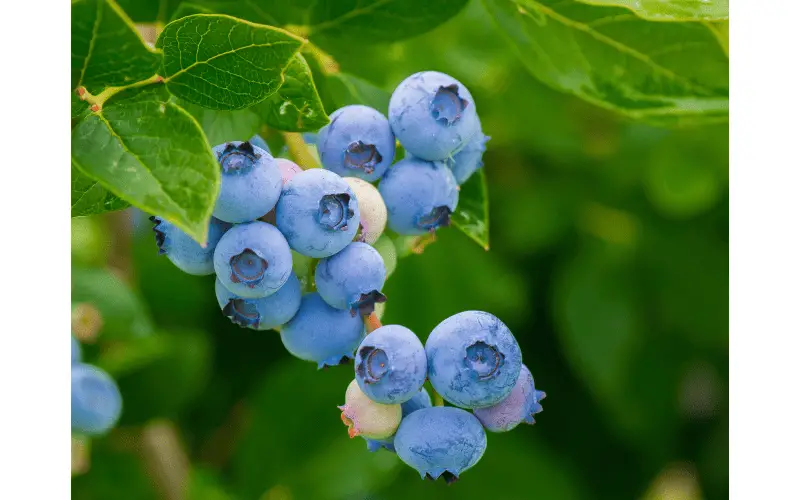
Nutritional Value
Blueberries are a nutrient-dense fruit that offers numerous health benefits. They are rich in vitamins C and K, antioxidants, and dietary fiber. These nutrients contribute to overall health, support the immune system, and promote healthy digestion in Cavaliers.
Low in Calories
Blueberries are relatively low in calories compared to many other treats. This makes them suitable for dogs, including Cavaliers, who are on a weight management plan or need portion-controlled treats. Blueberries provide a satisfying sweetness without adding excessive calories to your dog’s diet.
Antioxidant Powerhouse
Blueberries are packed with antioxidants, including anthocyanins, which give them their vibrant color. Antioxidants help protect cells from oxidative damage caused by harmful free radicals, reducing the risk of chronic diseases and supporting overall health. Including blueberries as treats can provide these antioxidant benefits to your Cavalier.
Anti-inflammatory Properties
The antioxidants found in blueberries have anti-inflammatory properties, which can help reduce inflammation and support joint health in dogs. This is particularly beneficial for Cavaliers, who can be prone to certain joint issues, such as hip dysplasia. Offering blueberries as treats can contribute to their overall joint wellness.
Cognitive Health
Blueberries have been associated with cognitive health benefits, including improved memory and brain function. The antioxidants in blueberries may help protect brain cells from age-related damage, potentially supporting cognitive function in aging Cavaliers.
Easy to Feed
Blueberries are small, bite-sized fruits that are easy to feed as treats. Depending on your Cavalier’s preference, they can be offered whole or sliced. Their size makes them suitable for training sessions, interactive toys, or simply as a special reward for your furry friend.
Delicious Flavor
Many dogs enjoy the natural sweetness of blueberries. The taste of blueberries can entice dogs, making them an appealing treat option. The flavor can help keep your Cavalier engaged during training or provide a tasty and healthy snack throughout the day.
Hydration
Blueberries have a high water content, contributing to your Cavalier’s hydration. This can be beneficial, especially during hot weather or for dogs who may not drink enough water throughout the day. Offering blueberries as treats can help supplement your dog’s water intake and promote adequate hydration.
When offering blueberries as treats, washing them thoroughly to remove any potential pesticides or contaminants is important. Feeding blueberries in moderation is also recommended due to their natural sugar content. As with any new food, introduce blueberries gradually into your Cavalier’s diet and monitor for any signs of digestive upset or allergies.
5. Sliced Apples
Remove the seeds and core, then cut into small, bite-sized pieces.
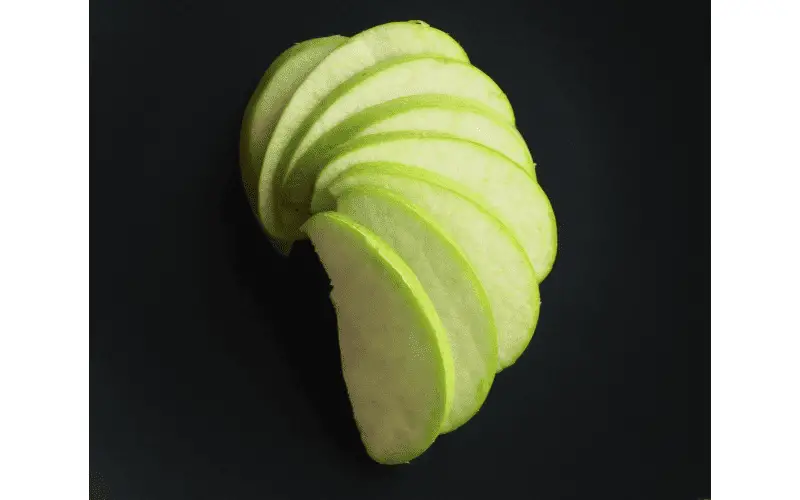
Nutritional Value
Apples are a nutritious fruit that offers several health benefits. They are a good source of dietary fiber, vitamin C, and antioxidants. These nutrients support overall health, boost the immune system, and promote healthy digestion in Cavaliers.
Low in Calories
Apples are relatively low in calories, making them a healthy treat option for dogs, including Cavaliers. They provide a natural sweetness without adding excessive calories to your dog’s diet. Apples can be a satisfying snack without contributing to weight gain or obesity.
Fiber-Rich
Apples are rich in dietary fiber, particularly soluble fiber called pectin. Fiber promotes healthy digestion and regular bowel movements, helping prevent constipation in dogs. Including sliced apples as treats can contribute to your Cavalier’s digestive health and support their overall well-being.
Hydration
Apples have a high water content, which can help keep your dog hydrated. Providing sliced apples as treats can be a way to increase your Cavalier’s water intake, especially during hot weather or if your dog doesn’t drink enough water throughout the day.
Dental Health
The natural texture of apples can help clean your Cavalier’s teeth. Chewing on apple slices can stimulate saliva production and promote the removal of plaque and food debris from the teeth’s surface. However, it’s important to note that apples should not replace regular brushing or professional dental care for your dog.
Antioxidant Properties
Apples contain antioxidants, such as vitamin C and flavonoids, which help neutralize harmful free radicals in the body. Antioxidants support the immune system, reduce inflammation, and improve overall health. Offering sliced apples as treats can provide these antioxidant benefits to your Cavalier.
Variety and Texture
Sliced apples offer a different texture and taste compared to traditional dog treats. The crispness and juiciness of apples can be enjoyable for dogs, adding variety to their treat options. Cavaliers can appreciate the texture and the satisfying crunch that apple slices provide.
Easy to Prepare
Slicing apples into small, bite-sized pieces is simple and can be done easily at home. Before slicing, you must remove the apple core and seeds to ensure your Cavalier doesn’t ingest any potentially harmful parts. Remember to remove any seeds or pits, as these can be choking hazards.
When offering sliced apples as treats, removing the apple seeds and core is important, as they contain small amounts of cyanide, which is toxic to dogs. Additionally, some dogs may have trouble digesting apple peel, so you may choose to peel the apple before slicing it.
6. Pumpkin Cubes
Cooked or canned pumpkin can be cut into small cubes for a healthy treat.
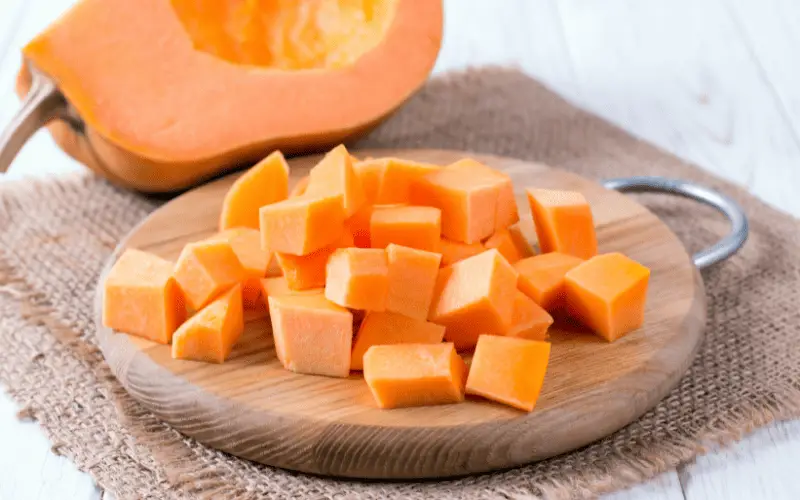
Digestive Health
Pumpkin is known for its beneficial effects on digestion in dogs. It is rich in dietary fiber, including soluble and insoluble fiber. The fiber content in pumpkin can help regulate bowel movements, promote healthy digestion, and alleviate constipation or diarrhea in Cavaliers.
Weight Management
Pumpkin is low in calories and contains high water content, making it a suitable treat option for dogs on a weight management plan. It can provide a satisfying and filling snack without adding excessive calories to your Cavalier’s diet.
Nutritional Value
Pumpkin is packed with essential vitamins and minerals, including vitamins A, C, potassium, and beta-carotene. These nutrients contribute to overall health, support immune function, and promote healthy skin and coat in Cavaliers.
Moisture Content
Pumpkin has a high moisture content, which can help keep your dog hydrated. Offering pumpkin cubes as treats can be a way to supplement your Cavalier’s water intake, especially if they are not drinking enough water throughout the day or during hot weather.
Digestive Upset Relief
Pumpkin is often recommended as a natural remedy for digestive upset in dogs, including diarrhea or mild gastrointestinal issues. The soluble fiber in pumpkin can help absorb excess moisture in the intestines and firm up loose stools. It can be particularly beneficial during dietary transitions or when your Cavalier experiences temporary digestive disturbances.
Flavor and Variety
Many dogs, including Cavaliers, enjoy the taste of pumpkin. The naturally sweet and earthy flavor can appeal to dogs, making pumpkin cubes an enticing treat. The variety in texture and taste can provide a welcome change from traditional treats.
Allergen-Free and Easy to Prepare
Pumpkin is considered a hypoallergenic food for most dogs, making it suitable for Cavaliers with dietary sensitivities or allergies. You can easily prepare pumpkin cubes by cutting fresh pumpkin into small, bite-sized pieces. It’s important to remove the seeds and rind before offering the pumpkin to your dog.
Nutritional Support
Pumpkin is often recommended for dogs with certain health conditions, such as urinary tract issues or anal gland problems. The high moisture content and fiber in pumpkin can support urinary health and help regulate bowel movements, respectively. Consult with your veterinarian if you are considering incorporating pumpkin cubes as treats for specific health concerns.
When offering pumpkin cubes as treats, it’s important to use plain, cooked pumpkin without any added sugars, spices, or additives. Canned plain or fresh pumpkin that has been cooked and mashed are suitable options. Avoid using pumpkin pie filling, as it often contains added ingredients that may be harmful to dogs.
As with any treats, moderation is key. Monitor the quantity of pumpkin cubes you offer to prevent overconsumption, as excessive fiber intake can lead to gastrointestinal upset. If your Cavalier has any specific health conditions or dietary restrictions, consult your veterinarian for personalized recommendations before introducing pumpkin or any new foods into their diet.
7. Yogurt Drops
Look for dog-friendly yogurt treats or freeze small portions of plain yogurt.
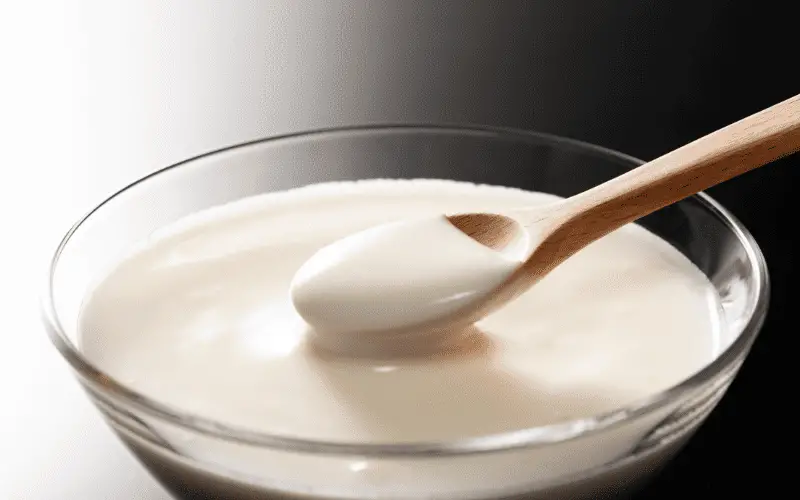
Probiotic Benefits
Yogurt contains beneficial bacteria known as probiotics, which support a healthy gut flora in dogs. Probiotics help maintain the balance of good bacteria in the digestive system, promoting optimal digestion and nutrient absorption; including yogurt drops as treats can contribute to your Cavalier’s gut health and overall well-being.
Calcium and Protein
Yogurt is a good source of calcium and protein, which are important for the growth, development, and maintenance of healthy bones, muscles, and tissues in dogs. Calcium supports strong teeth and bones, while protein is necessary for building and repairing body tissues. Providing yogurt drops as treats can supplement your Cavalier’s calcium and protein intake.
Digestive Health
The probiotics in yogurt can aid digestion and alleviate dog digestive issues, such as diarrhea or upset stomach. The live cultures in yogurt help regulate the intestinal microflora and promote a healthy digestive system. Feeding your Cavalier yogurt drops can be especially beneficial during times of digestive upset or when transitioning to a new diet.
Cooling and Soothing
Yogurt drops can provide a cooling and soothing sensation for your Cavalier, making them a refreshing treat option, particularly during hot weather or after physical activity. The cool texture can be soothing to the mouth and throat, providing relief and hydration.
Training and Interactive Toys
Yogurt drops are small and easily manageable, making them suitable for training sessions or filling interactive toys. The taste and texture of yogurt drops can serve as a high-value reward during training, helping reinforce positive behaviors in your Cavalier.
Variety and Flavor
Yogurt drops come in different flavors and variations, adding variety to your Cavalier’s treat options. Dogs often find yogurt drops delicious and enjoyable. The creamy texture and sweet taste can make them an appealing and satisfying treat.
Nutritional Supplementation
Yogurt drops can serve as a nutritional supplement for certain dogs, especially those with specific dietary needs or those on restricted diets. For example, if your Cavalier is on a diet that restricts certain foods or nutrients, yogurt drops can be a way to provide additional calcium, protein, and probiotics.
When offering yogurt drops as treats, choosing plain, unsweetened yogurt without any artificial sweeteners, additives, or flavors is important. Some dogs may be lactose intolerant, so it’s recommended to introduce yogurt gradually and monitor for any signs of digestive upset. Consult with your veterinarian if you have any concerns or if your Cavalier has specific dietary restrictions or health conditions.
As with any treats, moderation is key. Yogurt drops should be in appropriate portions to avoid overconsumption and potential weight gain. It’s important to consider the overall calorie intake from treats in your Cavalier’s daily diet.
Always supervise your dog while enjoying yogurt drops or other treats to ensure they eat them safely and without choking. If your Cavalier experiences any adverse reactions or allergies to yogurt, discontinue use and consult with your veterinarian for alternative treat options.
8. Peanut Butter
A spoonful of unsalted, natural peanut butter can be a special treat.
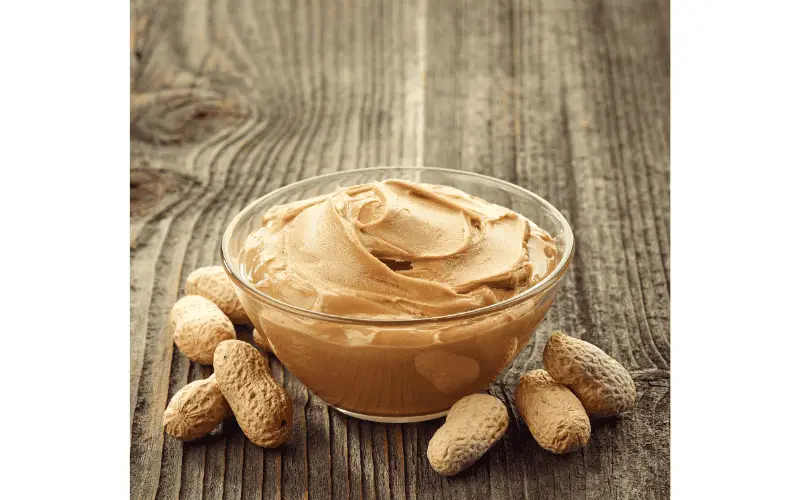
Taste and Palatability
Peanut butter has a rich, nutty flavor that many dogs find highly appealing. Its creamy texture and savory taste make it a popular treat option for dogs, making training, rewarding, or simply treating your Cavalier an enjoyable experience.
High in Protein
Peanut butter is a good source of plant-based protein, which is essential for muscle development, repair, and overall health in dogs. Protein is particularly important for active breeds like Cavaliers, as they require sufficient protein intake to support their energy levels and muscle function.
Healthy Fats
Peanut butter contains healthy fats, including monounsaturated and polyunsaturated fats. These fats provide a concentrated energy source and contribute to the overall balance of nutrients in your Cavalier’s diet. They also support a healthy coat and skin and promote proper brain function.
Nutritional Value
Peanut butter contains various essential vitamins and minerals that benefit your Cavalier’s health. It is a good source of vitamin E, which acts as an antioxidant and supports the immune system. Additionally, peanut butter contains B vitamins, such as niacin and folate, which are important for energy production and overall metabolic function.
Mental Stimulation
Peanut butter can be used in interactive toys or treat-dispensing puzzles to provide mental stimulation for your Cavalier. Licking peanut butter from these toys engages their senses and keeps them occupied, providing both physical and mental exercise.
Easy to Administer Medication
Peanut butter can be a useful tool for administering medication to your Cavalier. The sticky texture and strong peanut butter flavor can help mask the taste and smell of medication, making it easier to give them oral medications.
Training and Behavior
Peanut butter can be an effective training aid for Cavaliers. Its strong smell and taste make it a high-value reward that can motivate and reinforce positive behaviors during training sessions. Using peanut butter as a reward can help make training more enjoyable and successful for both you and your Cavalier.
Digestive Health
While peanut butter is generally safe for dogs, choosing a peanut butter brand that does not contain additives like xylitol, which can be toxic to dogs, is important. Additionally, peanut butter should be given in moderation, as it is high in calories and fat.
Also, remember to choose natural, unsalted varieties that do not contain added sugars or artificial sweeteners. The ingredient list should ideally be limited to peanuts. Introducing peanut butter gradually ensures your Cavalier tolerates it well and has no adverse reactions.
Too much peanut butter can lead to weight gain or gastrointestinal upset. Always check the ingredients and consult with your veterinarian for personalized recommendations.
9. Cottage Cheese
A small portion of low-fat cottage cheese can be a protein-rich snack.
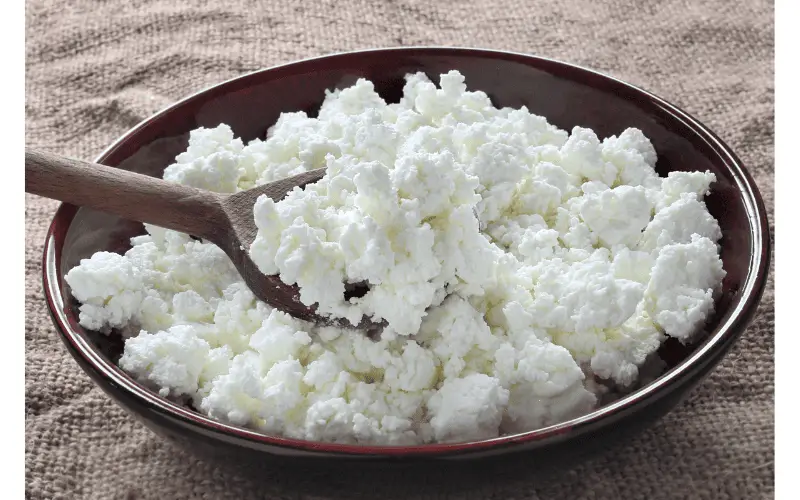
High-Quality Protein
Cottage cheese is a rich source of high-quality protein essential for muscle development, repair, and overall health in dogs. Protein is vital in supporting your Cavalier’s growth, maintaining a healthy coat, and supporting various bodily functions.
Digestive Health
Cottage cheese is relatively low in lactose compared to other dairy products, making it more easily digestible for dogs, including Cavaliers. It contains beneficial bacteria, such as Lactobacillus acidophilus, that promote a healthy gut flora and aid digestion. Introducing cottage cheese as a treat can help support your dog’s digestive health.
Calcium and Phosphorus
Cottage cheese is a good source of calcium and phosphorus, important minerals for maintaining strong bones and teeth in dogs. Calcium also contributes to proper muscle function, blood clotting, and nerve transmission. Including cottage cheese as a treat can provide additional calcium and phosphorus to support your Cavalier’s skeletal health.
Weight Management
Cottage cheese is relatively low in calories and fat compared to many other treats, making it a suitable option for Cavaliers on a weight management plan. It can be a satisfying and nutritious treat without adding excessive calories to your dog’s diet.
Palatability
Many dogs find cottage cheese highly palatable due to its creamy texture and mild taste. Its palatability makes it a convenient option for training, rewarding, or simply treating your Cavalier.
Hydration
Cottage cheese has a high moisture content, which can contribute to your Cavalier’s hydration. This can be especially beneficial during hot weather or for dogs who don’t drink enough water. Adding cottage cheese to your dog’s diet or offering it as a treat can help maintain their hydration.
Nutritional Variety
Cottage cheese can add nutritional variety to your Cavalier’s diet. Introducing cottage cheese as an occasional treat gives your dog a different texture, taste, and nutrient profile than their regular meals.
Easy to Customize
Cottage cheese can be easily customized to add safe ingredients or flavors for dogs. You can mix cottage cheese with fruits like blueberries or slices of banana or even incorporate some vegetables like diced carrots or green beans. This customization can further enhance the taste and nutritional value of the treat.
When offering cottage cheese as a treat, choosing plain, unsweetened varieties without any added sugars, sweeteners, or artificial additives is essential. Monitor your Cavalier’s response to cottage cheese, especially if they have known dairy sensitivities or allergies. If you have concerns or if your Cavalier has specific dietary restrictions, consult with your veterinarian for personalized recommendations.
10. Cheese Cubes
Cut small pieces of low-fat cheese as an occasional indulgence.
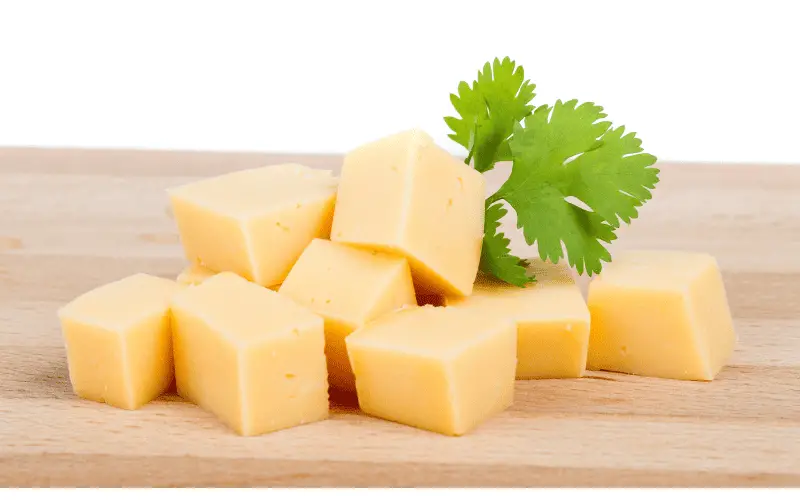
High-Value Reward
Cheese is known for its strong aroma and delicious taste, which makes it a high-value reward for dogs, including Cavaliers. Cheese’s rich and savory flavor can be highly motivating during training sessions or as a special treat.
High in Protein
Cheese is a good source of protein, which is essential for your Cavalier’s muscle development, repair, and overall health. Protein supports various bodily functions and contributes to maintaining healthy skin, coat, and muscles.
Calcium and Phosphorus
Cheese is a natural source of calcium and phosphorus, two essential minerals for maintaining strong bones and teeth in dogs. These minerals are crucial for your Cavalier’s skeletal development and overall bone health.
Palatability
Many dogs find cheese extremely palatable. The creamy and smooth texture of the cheese and its rich flavor can make it an enticing treat option for your dog.
Mental Stimulation
Cheese can be used in interactive toys or treat-dispensing puzzles to stimulate your Cavalier mentally. The challenge of extracting the cheese from these toys engages their problem-solving skills and keeps them entertained.
Versatility
Cheese cubes can be easily customized and cut into bite-sized pieces, making them a versatile treat option. You can use different types of cheese to provide variety and cater to your Cavalier’s preferences.
Training Aid
Cheese cubes can be a valuable tool for training your Cavalier. Cheese’s strong aroma and taste can help grab their attention and encourage desired behaviors. Using cheese as a reward during training can make learning more enjoyable and effective.
Bonding and Positive Association: Sharing a cheese cube with your Cavalier can strengthen the bond between you and your dog. Offering them cheese as a treat reinforces positive associations, making training and interactions more enjoyable for both of you.
When offering cheese cubes as treats, it’s important to consider a few factors:
- Cheese should be given in moderation, as it is high in fat and calories. Excessive cheese consumption can contribute to weight gain or gastrointestinal upset. Consider the size and dietary needs of your Cavalier when determining the appropriate portion size.
- Some dogs may be lactose intolerant or have difficulty digesting dairy products. Monitor your dog’s response to cheese and consult your veterinarian if you suspect any digestive issues or sensitivities.
- Not all types of cheese are suitable for dogs. Some cheeses, like blue cheese or those with added flavorings or seasonings, can be harmful or contain toxic ingredients to dogs. Stick to plain, dog-safe cheeses like cheddar, mozzarella, or Swiss.
As with any treats, it’s essential to incorporate cheese into your Cavalier’s overall balanced diet. Adjust their regular meals accordingly to account for the additional calories and fat from cheese treats.
Points to Note
Remember that not all treats are suitable for dogs to consume
As with any treats, moderation is key. While treats are highly enjoyable for dogs, it’s important to consider their overall calorie intake and ensure that treats are given in appropriate quantities to prevent weight gain.
Always follow the feeding guidelines provided by the manufacturer or consult with a canine dietician for specific dietary recommendations for your Cavalier King Charles Spaniel.
Remember to introduce new foods gradually and speak to your vet if you have any concerns about your dogs specific dietary needs or sensitivities.
